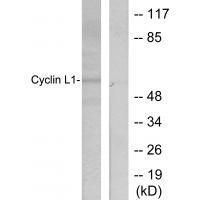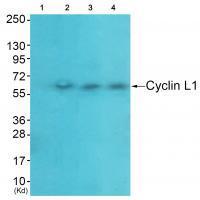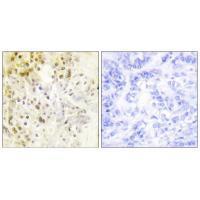


| WB | 咨询技术 | Human,Mouse,Rat |
| IF | 咨询技术 | Human,Mouse,Rat |
| IHC | 1/50-1/100 | Human,Mouse,Rat |
| ICC | 技术咨询 | Human,Mouse,Rat |
| FCM | 咨询技术 | Human,Mouse,Rat |
| Elisa | 咨询技术 | Human,Mouse,Rat |
| Aliases | Cyclin-L; CCNL1; |
| Entrez GeneID | 57018; |
| WB Predicted band size | 60kDa |
| Host/Isotype | Rabbit IgG |
| Antibody Type | Primary antibody |
| Storage | Store at 4°C short term. Aliquot and store at -20°C long term. Avoid freeze/thaw cycles. |
| Species Reactivity | Human,Mouse,Rat |
| Immunogen | Synthesized peptide derived from human Cyclin-L1. |
| Formulation | Purified antibody in PBS with 0.05% sodium azide. |
+ +
1. **"Cyclin L1 is involved in the splicing machinery and interacts with CDK11p58"**
- **作者**: Dickmanns, M. et al. (2002)
- **摘要**: 研究揭示了Cyclin-L1与CDK11p58的相互作用,并利用特异性抗体证实其在剪接体复合物中的定位,表明其参与RNA剪接调控。
2. **"Cyclin L1 expression in hepatocellular carcinoma: correlation with clinicopathological features"**
- **作者**: Li, Y. et al. (2015)
- **摘要**: 通过免疫组化分析Cyclin-L1在肝癌组织中的表达,发现其高表达与肿瘤分化程度及患者预后不良相关,提示其作为潜在肿瘤标志物。
3. **"Cyclin L1 as a biomarker for early detection and therapeutic target in breast cancer"**
- **作者**: Zhang, H. et al. (2020)
- **摘要**: 利用Cyclin-L1抗体进行Western blot和免疫荧光实验,发现其在乳腺癌细胞中异常高表达,并通过敲低实验验证其对细胞增殖的调控作用。
4. **"Functional characterization of Cyclin-L1 in cell cycle progression using RNAi and antibody-based approaches"**
- **作者**: Nakamura, T. et al. (2010)
- **摘要**: 结合siRNA和Cyclin-L1抗体研究其功能,发现Cyclin-L1通过调控G1/S期转换影响细胞周期进程,且在多种癌细胞系中表达上调。
Cyclin-L1. a member of the cyclin protein family, plays a dual role in regulating both transcription and RNA processing. Unlike classical cyclins involved in cell cycle control, Cyclin-L1 primarily interacts with cyclin-dependent kinase 11 (CDK11) to form a complex that influences pre-mRNA splicing and transcriptional elongation. It is expressed in various tissues and localized to nuclear speckles, suggesting involvement in coordinating nuclear RNA metabolism.
Cyclin-L1 antibodies are essential tools for investigating its functional mechanisms and protein interactions. Researchers use these antibodies in techniques like Western blotting, immunoprecipitation, and immunofluorescence to study Cyclin-L1 expression patterns, subcellular localization, and association with splicing factors. Emerging evidence links Cyclin-L1 dysregulation to cancer progression (e.g., colorectal cancer, glioblastoma) and neurological disorders, making its antibodies valuable for biomarker studies. Some studies explore Cyclin-L1's potential role in viral infection responses through mRNA processing modulation.
Commercial Cyclin-L1 antibodies are typically raised against specific epitopes in its N-terminal or C-terminal regions, with validation across species (human, mouse, rat). However, researchers must verify antibody specificity due to sequence homology with other cyclin family members. Ongoing research continues to clarify Cyclin-L1's pathophysiological roles, driving demand for reliable antibodies in both basic and translational studies.
×